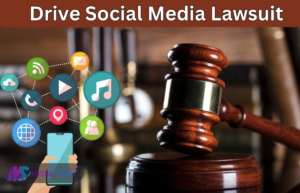The topic of the Drive Social Media lawsuit has raised eyebrows and sparked countless conversations in the digital marketing space. The Drive Social Media lawsuit has brought forth serious allegations and uncovered how social media agencies can sometimes go off course from ethical business practices. With more businesses investing heavily in online visibility, this lawsuit provides insight into the potential pitfalls of working with marketing agencies.
What Is Drive Social Media?
Drive Social Media is a marketing firm that claims to help businesses grow by leveraging data-driven advertising strategies. They cater to small- and medium-sized enterprises, promising lead generation, increased sales, and digital visibility across platforms like Facebook, Instagram, and Google. The company has offices in multiple cities and positions itself as an ROI-focused agency.
Allegations in the Drive Social Media Lawsuit
The core of the Drive Social Media lawsuit involves allegations from clients who claimed the agency did not deliver on its promises. These clients argue that they were misled by inflated performance projections, misleading contracts, and questionable billing practices.
Specific Allegations Include:
- Exaggerated ROI projections that were not backed by performance
- Lock-in contracts with hefty cancellation fees
- Poor communication and lack of transparency
- Non-disclosure of ad spend vs. management fees
- Refusal to refund clients after dissatisfaction
Real Client Experiences
Some former clients have stepped forward with troubling experiences. Business owners report being shown flashy pitch decks and success stories during the onboarding process, only to receive lackluster results later. The legal complaints allege that Drive Social Media focused more on sales than actual service delivery.
Client Testimonials From Lawsuit Filings:
- “They sold me the dream and delivered nothing.”
- “I was billed thousands and never saw one qualified lead.”
- “Trying to get out of the contract was a nightmare.”
Legal Grounds of the Lawsuit
The legal foundation for the Drive Social Media lawsuit centers on breach of contract, misrepresentation, and fraudulent business practices. Plaintiffs argue that Drive Social Media failed to perform under the agreed-upon terms and misled them intentionally.

Key Legal Points:
- Misrepresentation of service capabilities
- Deceptive marketing tactics
- Breach of implied good faith and fair dealing
Industry Impact
This lawsuit is not just about one company. It highlights broader issues within the digital marketing space. There are numerous small agencies that overpromise results to attract clients. Many use complicated contracts and dashboards to mask underperformance.
The Drive Social Media lawsuit serves as a case study for business owners, urging them to ask the right questions and vet agencies thoroughly before signing long-term contracts.
How Agencies Can Avoid Similar Lawsuits
The case shows that transparency and integrity are non-negotiable in business. Marketing firms must:
- Clearly explain their pricing models
- Offer realistic performance forecasts
- Provide monthly performance reports
- Be open to client feedback
What Businesses Should Look for in a Marketing Partner
Before hiring an agency, businesses should look for:
- Transparent pricing
- Case studies with measurable results
- Month-to-month contracts or low-risk terms
- Clear explanations of deliverables
- Ongoing communication and reporting
Red Flags to Avoid:
- Promises of “guaranteed” ROI
- Overly aggressive salespeople
- Lock-in contracts with heavy penalties
- Vague performance dashboards
- No client testimonials or portfolio
Expert Legal Opinions
Marketing law experts note that lawsuits like this are becoming more common. Businesses are learning to challenge agencies legally if they feel misled. This reflects the growing need for ethical accountability in the digital marketing space.
Legal professionals advise:
- Reading contracts carefully
- Documenting all agency interactions
- Asking for clear definitions of success
The Outcome and What Comes Next
As of now, the Drive Social Media lawsuit is still ongoing. The outcomes could range from settlement agreements to legal penalties, depending on court findings. What’s certain is that the case has brought attention to the need for honesty in client-agency relationships.
What This Means for Small Businesses
The biggest takeaway is to stay cautious. Small business owners should:
- Avoid getting dazzled by marketing jargon
- Request data proof before signing anything
- Look at online reviews and Better Business Bureau ratings
Staying informed helps prevent becoming the next victim of a misleading agency.

Final Thoughts on the Drive Social Media Lawsuit
The Drive Social Media lawsuit stands as a cautionary tale. It shows what can happen when businesses don’t ask enough questions and when agencies don’t deliver what they promise. In a world filled with buzzwords and digital hype, real results and trust matter more than ever.
FAQs
1. What is the Drive Social Media lawsuit about?
It’s about clients accusing the agency of misrepresentation, poor performance, and unethical contract practices.
2. Who filed the lawsuit against Drive Social Media?
Former clients who believed they were misled or financially harmed filed the lawsuit.
3. Is Drive Social Media still in business?
Yes, they are still operating but facing legal challenges that could affect their reputation.
4. Can I sue a marketing agency like Drive Social Media?
Yes, if there is evidence of fraud, misrepresentation, or breach of contract, legal action is an option.
5. What should I check before hiring a marketing firm?
Look for transparency, realistic expectations, reviews, and short-term contract options.
6. How can I avoid getting scammed by a marketing agency?
Ask detailed questions, read contracts carefully, and request performance metrics in writing.







